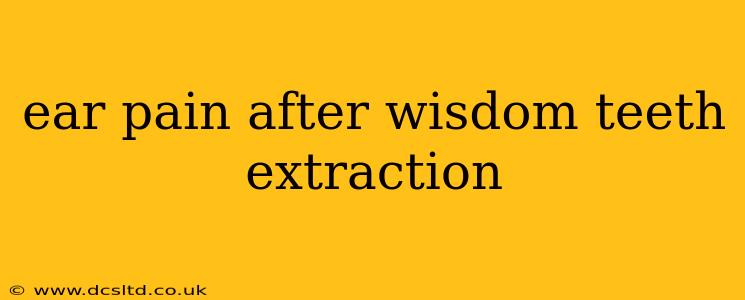Wisdom teeth extraction is a common procedure, but it often comes with post-operative discomfort. While jaw pain and swelling are expected, ear pain after wisdom teeth extraction can be concerning. This comprehensive guide explores the causes, effective treatments, and preventative measures to alleviate this often-overlooked complication.
What Causes Ear Pain After Wisdom Teeth Extraction?
Ear pain following wisdom teeth removal isn't directly caused by the extraction site itself. Instead, it's usually a referred pain, meaning the pain originates elsewhere but is felt in the ear. The close proximity of the nerves and tissues in the jaw and ear region explains this phenomenon. Several factors contribute to this referred pain:
-
Inflammation and Swelling: Post-operative swelling in the jaw can put pressure on the nerves that connect to the ear, resulting in pain. This swelling is a normal part of the healing process, but excessive swelling can exacerbate ear pain.
-
Nerve Irritation: The nerves in the jaw area can be irritated during the extraction process. This irritation can lead to pain that radiates to the ear. The mandibular nerve, which runs close to the wisdom teeth, is particularly implicated.
-
Sinus Infection (Less Common): In some cases, ear pain can be a symptom of a developing sinus infection, especially if the wisdom teeth extraction involved significant manipulation near the maxillary sinuses. This is less common but requires immediate attention.
-
Dry Socket (Alveolar Osteitis): While typically causing jaw pain, a dry socket (a painful complication where the blood clot at the extraction site dislodges) can indirectly contribute to ear pain through increased inflammation and pressure.
Is Ear Pain After Wisdom Teeth Extraction Normal?
Some degree of ear discomfort is considered relatively normal in the initial days following wisdom teeth extraction, particularly due to the swelling and inflammation. However, severe or persistent ear pain should never be ignored. It's crucial to contact your oral surgeon or dentist if you experience intense ear pain, especially if accompanied by other symptoms like fever, increased swelling, or difficulty opening your mouth.
How to Treat Ear Pain After Wisdom Teeth Extraction
Several strategies can help manage ear pain after wisdom teeth extraction:
-
Over-the-counter pain relievers: Ibuprofen or acetaminophen (paracetamol) can effectively reduce pain and inflammation. Always follow the recommended dosage instructions.
-
Ice packs: Applying ice packs to the jaw for 15-20 minutes at a time, several times a day, can help reduce swelling and alleviate pain.
-
Rest: Adequate rest allows your body to focus on healing, minimizing inflammation and reducing pain.
-
Gentle rinsing: After the initial healing period (as advised by your dentist or oral surgeon), gently rinsing your mouth with saltwater can help maintain oral hygiene and prevent infection.
-
Prescription medication: Your oral surgeon might prescribe stronger pain relievers or antibiotics if needed, especially if there's an indication of infection.
How Long Does Ear Pain After Wisdom Teeth Extraction Last?
The duration of ear pain varies depending on individual healing rates and the extent of the surgical procedure. Most people experience some level of discomfort for a few days, with the pain gradually subsiding within a week. If the pain persists beyond a week or worsens, seek professional medical advice immediately.
What Should I Do If I Have Severe Ear Pain After Wisdom Teeth Extraction?
Severe ear pain after wisdom teeth extraction warrants immediate medical attention. Contact your oral surgeon or dentist immediately if you experience:
- Intense, unrelenting pain
- High fever
- Increased swelling
- Pus or foul-smelling discharge
- Difficulty opening your mouth
- Facial numbness or tingling
These symptoms may indicate a serious complication such as infection or dry socket requiring prompt treatment.
Can I Prevent Ear Pain After Wisdom Teeth Extraction?
While you can't entirely prevent ear pain, some measures can significantly reduce your risk:
-
Follow post-operative instructions meticulously: Your oral surgeon's instructions are crucial for minimizing complications and promoting healing. Strict adherence to these instructions is vital.
-
Maintain good oral hygiene: Proper brushing and flossing (after the initial healing period) help prevent infection, minimizing the risk of inflammation and referred pain.
-
Elevate your head: Sleeping with your head elevated can reduce swelling and pressure on the nerves.
This information is for general knowledge and does not constitute medical advice. Always consult your dentist or oral surgeon for diagnosis and treatment of any oral health concerns. They can provide personalized guidance based on your specific situation and medical history.
